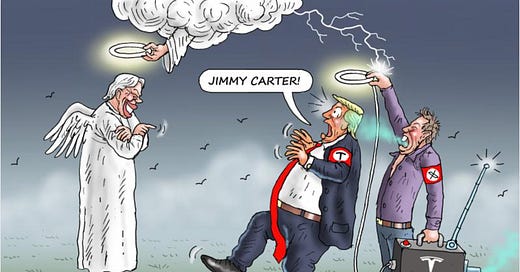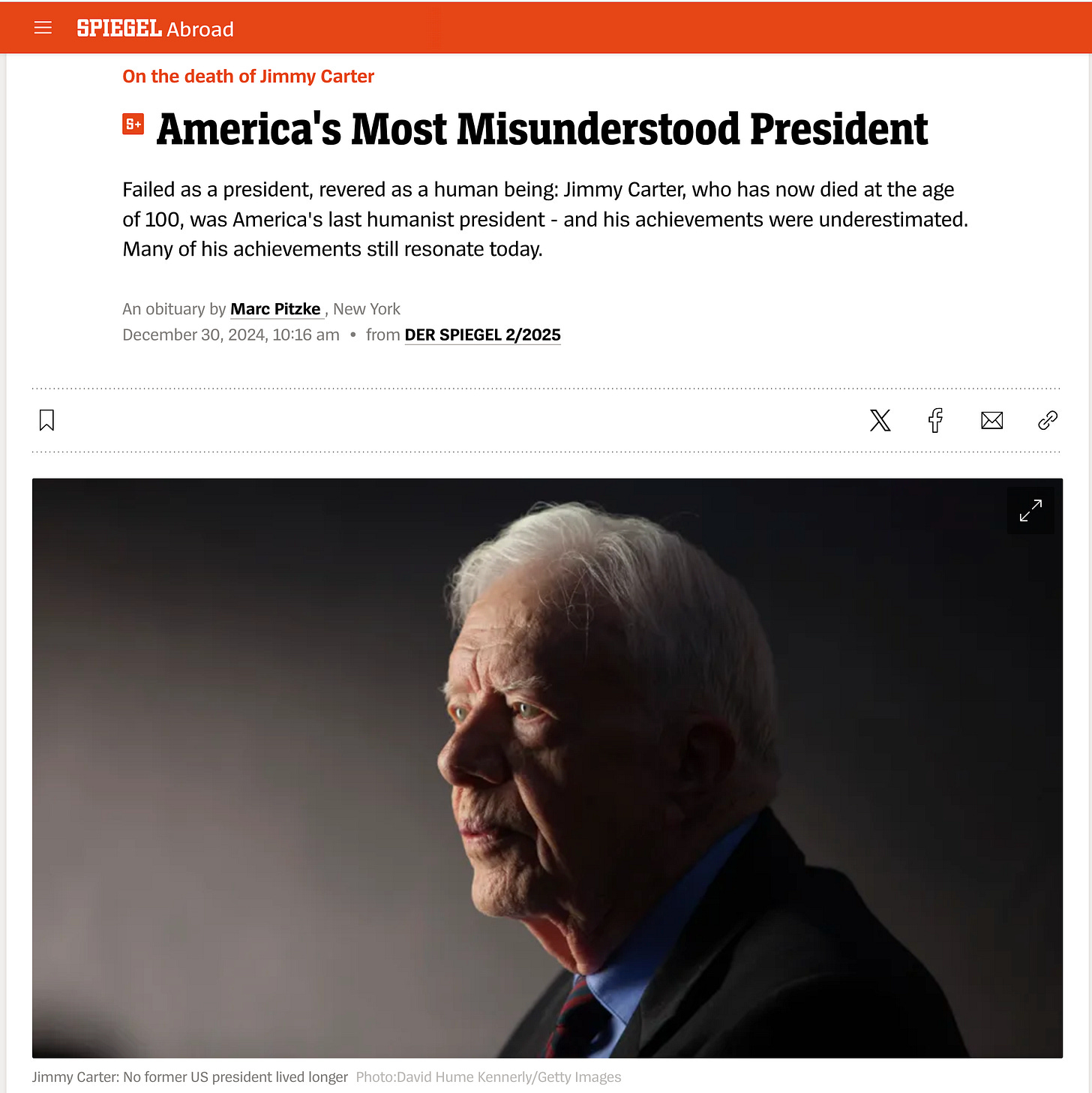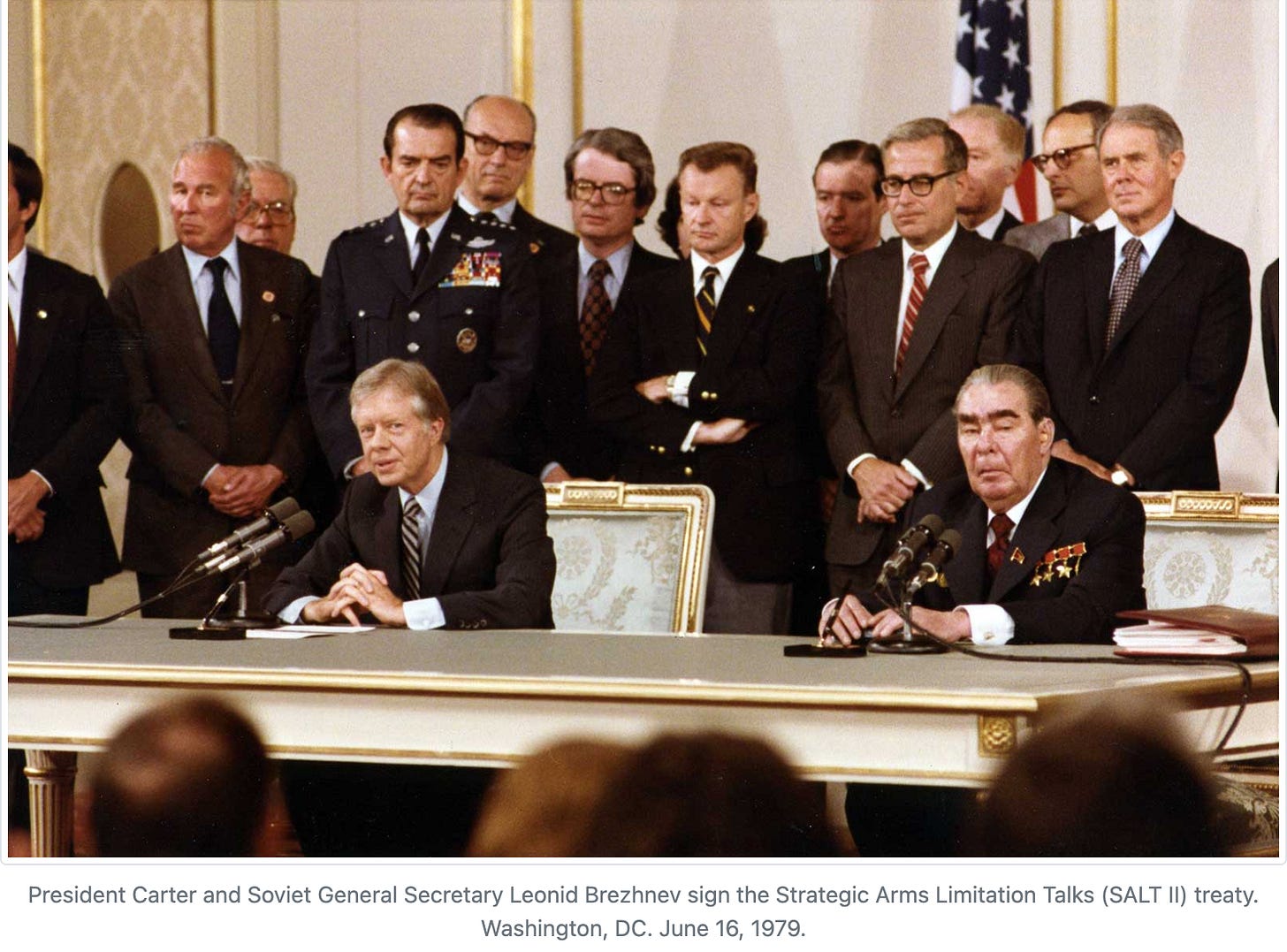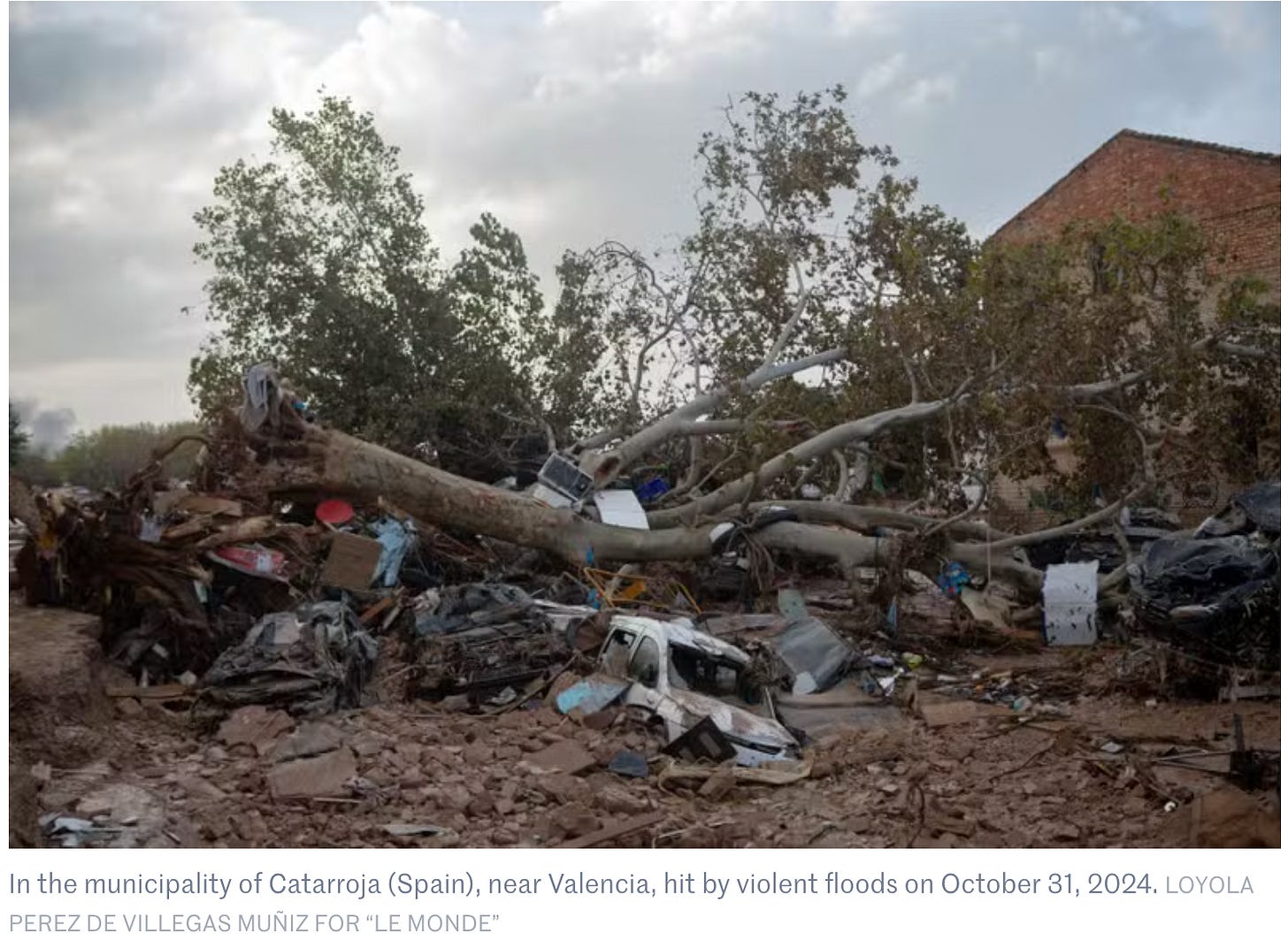TWTW: The World This Week #124
Jimmy Carter a global symbol...a personal memoir....Ukraine still spinning...as Poland frets...Syria's helping hand?...Our planet's perils...& Elon's answer...for our paid: China's metal storm & more
In this weekly feature for Andelman Unleashed, we continue to explore how the media of other nations are reporting and commenting on the United States, and how they are viewing the rest of the world.
To emphasize, we cover lots of ground….So, you may not want to read it all, but it's all here for you!
If your preferred delivery is audio, we’ve debuted, for our (lightly) paid members, a new Unleashed Audio version read by the author with a link below the fold!
How others see America
Jimmy Carter around the world….
The death of Jimmy Carter highlighted to the world an America that might have been. There was hardly a front page that failed to take note of the passing of this global icon of all that is right and good about democracy, liberty and the American way of life—a beacon to so many people and their governments.
Le Monde / Paris
BBC / London
South China Morning Post / Hong Kong
Der Spiegel / Germany
Le Parisien / Paris
Straits-Times Singapore
An American diplomat, now in Washington, remembers vividly the day in Beijing—many years after Mr Jimmy Carter had left the White House—when he asked a group of Chinese students if they knew anything about him.
“All their hands shot up,” he recalled. “And they said, ‘He recognised China’.”
While the stage had been set earlier for the historic event by two-term US President Richard Nixon and his Secretary of State Henry Kissinger, it was still certainly a fateful decision when, on Jan 1, 1979, Washington recognised the government in Beijing as China’s legitimate government. Mr Carter was then in the middle of his 1977 to 1981 term as president of the United States.
Four months later, on April 10, 1979, the Taiwan Relations Act became law in Washington—and, without amendments, remains to this day the basis for the US’ relations with China and Taiwan.
El Pais Spain / Latin America
Haaretz / Israel
Two perspectives :
The Telegraph [opinion] / London
People's Daily / Beijing
Commentary: Carry on Carter's legacy for better China-U.S. ties
By Deng Xianlai
Jan. 1, 2025, marks the 46th anniversary of the establishment of China-U.S. diplomatic relations. Against the backdrop of profound changes unseen in a century and clamorous anti-China rhetoric among some U.S. politicians, it is time to remember late U.S. President Jimmy Carter's legacy and navigate this pivotal relationship forward.
Carter's determination to normalize China-U.S. relations in 1979, which he referred to as the "crowning achievement of his life," testified to his vision and courage. Amid Cold War tensions, Carter acted decisively to sever official ties with Taiwan, setting the stage for steady and sound growth of bilateral ties.
Today, as the bilateral relationship is encountering heavy headwinds, Carter's legacy serves as a reminder to Washington of the importance of strategic sobriety and vision.
If history is any guide, at the core of a sound China-U.S. relationship stands the common understanding that, despite widely differing political systems, historical experiences, and cultural backgrounds, the two countries share a profound stake in the stability and prosperity of the world….
China-U.S. relations are, in essence, defined by mutual benefit and win-win cooperation. Over the years, both nations have leveraged their complementary strengths to make bigger the "pie" of cooperation, bringing tangible benefits to both peoples.
Unleashed Memoir: Carter & Me (X Three)
In fact, during his presidency, Andelman personally had three somewhat indirect interactions with Carter and his entourage…. As I elaborated during three moments in my memoir-in-progress:
It was freezing and a light snow was falling—in other words typical post-Christmas weather—when Air Force one touched down in Warsaw late on that Friday evening. Polish leader Edward Gierek and a group of about 300 Polish officials and American embassy personnel welcomed him to Poland, waving tiny Polish and American flags. Carter’s aim, according to his national security adviser, Zbigniew Brzezinski, was to encourage the relative openness and liberalism that distinguished Poland from the Soviet Union and some of its other East European satellites—its leniency with dissent and dissenters (many were harassed, but few found their way to prisons) and its efforts to develop independently from the Kremlin and its leadership. Carter brought along quite a retinue—his wife Rosalynn, Secretary of State Cyrus Vance, Brzezinski and a host of aides…..
Carter went on from here to Teheran for a lavish reception by the Shah of Iran, the over-the-top nature of which unquestionably played a role in skewing the feelings of the Ayatollahs toward the president. But my next contact came two years later in Vienna. The day before his arrival, I'd just been expelled from Czechoslovakia by the communist government that had been less than thrilled by my reports, despite my pointing out to the apparatchiks who conveyed the news that this was just two days before Carter and Soviet leader Leonid Brezhnev were to sign the SALT II arms treaty in Vienna. The Czech officials shrugged.
I drove immediately to Vienna and picked up the story there …
I pitched up in Vienna shortly before 5 pm, checked in at the Hotel Sacher, and promptly rang James (Scotty) Reston. The grand old man of The Times Washington bureau—columnist, bureau chief, the epitome of the power and reach of the capital of the western world—Scotty, who was heading the paper’s delegation to the Carter-Brezhnev summit, was the person to tell about just what had transpired to the paper’s representative in Prague. He was immediately and suitably horrified.
“You’re coming with me,” he began. “We have to go up and see Jody.” Jody Powell was President Carter’s press secretary and one of the real power centers in the White House West Wing. He was well-installed in a lavish suite in the Sacher…
Scotty began by introducing me to Jody, who was sprawled on a Louis XIV style chair, clad in jeans, a plaid flannel shirt and well-worn boots. Then Reston launched into the headline—my expulsion. Before we’d had a chance to go further, a communicating door flew open and in blew Hodding Carter III. Now the State Department’s press secretary and spokesman, Jody gave Hodding the news, then both sat down as I launched into my story.
When I finished, there was a short pause, Jody looked at Hodding, then turned to us and drawled, “Well now, I don’t know if the Czecho-slovaks got a correspondent in Washington, but if they do, he’s gone.” Then grinned. Symmetrically, there was little more they could do. And, incidentally, they did make good on Jody’s pledge. It turns out that Rude Pravo did have a correspondent in Washington. Shortly after the Carter circus returned from Vienna, he was summoned to the State Department and given the word. It was pretty shocking to him...He’d built quite a nice, even lavish life for himself and his family in Washington over the many years that he’d been propagandizing (or perhaps even spying) for his communist “editors.” Suddenly, this was all yanked out from under him. He was given two weeks to get out of town (substantially more generous, reciprocally, than the hours I was given). He certainly knew the (relatively more) dismal life to which he’d be returning in Prague.
Finally, there was the Reagan inaugural. Carter, defeated in his bid for a second term, I was by then a newly minted CBS News correspondent and at their feet (almost literally) as network pool correspondent that morning:
The pool was dropped outside the Capitol in front of the viewing stand where in a short time, Chief Justice Warren Berger would administer the presidential oath of office—and for the first time on the Capitol's west side.
This event, however, was hardly taking place in a vacuum. It was very much a split-screen moment. Just as Chief Justice Berger had asked Ronald Reagan to swear he would "faithfully execute the office of President of the United States…” and a 21-gun salute began, 6,300 miles to the east a plane, with 52 American hostages, held for 444 days during the Carter presidency, lifted off from Teheran in two Algerian Air Boeing 727 jetliners, headed for freedom. The regime of Iran's Supreme Leader Ayatollah Khomeini wanted to make sure Jimmy Carter was no longer President of the United States before releasing the hostages. At the same time the US unfroze some $8 billion in Iranian assets (worth $29.5 billion in 2024 dollars).
We were able to watch both events—the Reagan inaugural and the jets lifting off from Teheran—live from our pool position….Reagan was told at his post-inaugural luncheon with Congressional leaders in the Capitol that the plane was in the air, allowing him to extemporize, "With thanks to Almighty God, I have been given a tag line that everyone waits for at the end of a toast,'' the President said after his brief remarks. ''Some 30 minutes ago, the Algerian planes bearing our prisoners left Iranian airspace and they're now free of Iran.'' As Bernard Gwertzman observed in The New York Times, "ringing applause drowned out his final remarks and Mr. Reagan responded by lifting a glass of white California wine to his lips and drinking to the end of the crisis."
So much has transpired since those far-off days that somehow America and so much of the world that followed us so closely seem equally to have lost their way, well on the way to spinning off the rails.
Special for the Paid !
Andelman Unleashed has unleashed new, (lightly) paid tiers.
Four new paid subscribers, an inscribed copy of my latest book, A Red Line in the Sand
Just another perk for our cherished, paid members of our Unleashed family, with a weekly portfolio of cartoons, largely from Cartooning for Peace … and eventually, a live Friday zoom with Andelman … Plus, the Audio Book version read by yours truly …. So do sign up … cheaper than a monthly mocha grande.
This will also help us subscribe to more (expensive!) media across the globe and support great journalism in multiple languages.
How others view the World
Ukraine spinning ever faster…. into a striking new year
A widely-heralded counter-offensive has begun as the new year is launched, as the BBC reported…
Ukraine has launched a fresh offensive in Russia's Kursk region, the Russian defence ministry says, as efforts to destroy the Ukrainian attack group were ongoing. Officials in Ukraine have also suggested an operation is under way.
"At around 9am Moscow time, in order to stop the offensive by the Russian troops in the Kursk direction, the enemy launched a counter-attack by an assault detachment consisting of two tanks, one counter-obstacle vehicle, and 12 armoured fighting vehicles," the defence ministry reported on Telegram. Several Russian military bloggers gave more details about the attack, saying it was launched from the Ukrainians' base at Sudzha towards the villages…on the way to Kursk city.
The head of Ukraine's presidential office, Andriy Yermak, said there "was good news from Kursk Region" and that Russia was "getting what it deserves". Ukraine's top counter-disinformation official Andriy Kovalenko said in Telegram: "The Russians in Kursk are experiencing great anxiety because they were attacked from several directions, and it came as a surprise to them."
It's unclear whether the offensive is sufficiently large-scale to lead to any significant changes on the frontline. Russian blogger Yury Podolyaka said the operation may have been diversionary, while another, Alexander Kots, did not rule out that the main attack could be launched somewhere else.
Meanwhile, the authoritative Institute for the Study of War chronicled several important Russian problems:
Ukrainian forces reportedly destroyed or damaged over 3,000 Russian tanks and almost 9,000 armored vehicles in 2024 as Russia continues to accrue vehicle losses that are likely unsustainable in the medium-term. Data from the Ukrainian General Staff indicates that Ukrainian forces destroyed or damaged 3,689 tanks, 8,956 infantry fighting vehicles (IFVs), 13,050 artillery systems, and 407 air defense systems in 2024. Russian forces reportedly lost at least 197 tanks, 661 armored personnel carriers (APCs), and 65 artillery systems larger than 100mm throughout the frontline during a period of intensified offensive operations in Donetsk Oblast in September and October 2024 and likely sustained a higher rate of tank and armored vehicle losses in June and July 2024 when Russian forces were conducting mechanized assaults in western Donetsk Oblast several times a week that often resulted in armored vehicle losses.
Russia's current armored vehicle and tank production rates indicate that such losses will likely be prohibitive over the longer term, particularly as Russia continues to dip into its Soviet-era stocks.
And then there are the neighbors…
As Jakub Iwaniuk reported from Warsaw in Le Monde…
Poland has a plan to become Europe's 'Eastern Shield'. The country has begun a massive reinforcement of its defense infrastructure on the borders with Russia and Belarus. Warsaw wants to build the premier land army in Europe.
The infrastructure is seen as a rampart aimed at protecting the whole of Europe, beyond just Poland. The 700-kilometre-long (435 mile) system is expected to be operational in 2028 and will cost 10 billion zlotys ($2.37 million). The border areas it runs along are largely wild, bordered by thick forests, marshes and hundreds of lakes. However, they have their vulnerable corridors, such as the “Brest Gate”, named after this city in Belarus, an 80-kilometre-wide strip of land that has been used many times throughout history for east-west troop movements. Warsaw is only 160 kilometres (100 miles) away….
The shield rests on three pillars. First, the heavy infrastructure: trenches, bunkers, anti-tank ditches, steel and concrete hedgehogs, as well as strips of land intended to be mined. Then comes the light infrastructure: the road networks between strategic points, hospitals and storage sites, communication networks, over an area that can penetrate up to 50 kilometers into the country.
Finally, the so-called "smart defense" elements: reconnaissance systems, satellite vision, and anti-drone measures, designed to prevent threats of a hybrid nature. The border area with Belarus, where 6,000 Polish soldiers are permanently stationed, has been deeply unstable since the summer of 2021….
"Poland must be prepared for the possibility of both a conventional and hybrid threat. The security of the entirety of NATO depends on it," insists Cezary Tomczyk Secretary of State in the Ministry of National defense. The shape of the Eastern Shield is largely inspired by experiences in the Ukrainian theatre of war. "The device is intended to be integrated into the 'Baltic defense line' launched by the Estonians, Latvians and Lithuanians," he adds. The United States and the United Kingdom are also "consultants" for the establishment of the infrastructure.
In Syria, help on the way?
Many of the still unanswered questions as to whither Syria in the post-Assad period revolve around perhaps the most difficult one—how to rebuild a nation and its people utterly shattered by two generations of purge and mayhem. But especially, which outside providers might be prepared to step in and just what strings might be attached?
So Saudi Arabia's Al Arabiya had one suggestion…
The first flight from King Khalid International Airport took off to Damascus carrying food, shelter and medical items. His Excellency the Advisor to the Royal Court and Supervisor General of the KS Relief Dr. Abdullah al-Rabeeah said that the air bridge began today, and another land bridge will follow over the coming few days—God willing—and provide urgent relief to the Syrian brothers."
Al-Rabeeah added that the act is a display of “humanitarian noble feeling” and the “help for brothers and friends in all corners of the world.” The total aid provided by Saudi Arabia to the Syrian people from 2011 to the end of 2024 amounted to $857 million.
Of course, the bulk of that aid had been channeled through the Assad regime—raising questions as to how much of it actually reached those most deeply in need. Still, Al Arabiya continued, suggesting just some of the obstacles ahead….
The GCC meeting, held in Kuwait, underscored that Syria’s security and stability are vital pillars of regional stability. The council highlighted the importance of respecting Syria’s sovereignty, independence, and territorial integrity while rejecting foreign interference in its internal affairs. It also stressed the need to combat terrorism, chaos, and extremism, while promoting respect for diversity and refraining from offending others’ beliefs….
The GCC condemned repeated Israeli attacks on Syrian territory, including the occupation of the buffer zone along the Syrian border, describing them as flagrant violations of Syria’s sovereignty and the 1974 disengagement agreement. The council called on the international community to assume its responsibilities in halting these attacks and demanded Israel’s withdrawal from all occupied Syrian territories.
And then that planet where we all live …
The year 2025 will be decisive for the climate in a world that is “more uncertain and turbulent than ever,” Audrey Garric reported in Le Monde:
The year 2024 is set to be declared the hottest on record, weather disasters are multiplying. The geopolitical context is more tense than ever, relegating the climate to the background, between wars, austerity, trade conflicts, political instabilities.
The climate emergency continues to worsen, as disasters multiply, from Cyclone Chido, which devastated Mayotte, to floods in Valencia (Spain). The year 2024, on track to be declared the hottest on record , will for the first time exceed the threshold of 1.5°C of warming compared to the pre-industrial era, the most ambitious objective of the Paris climate agreement.
At the same time, the geopolitical context is more tense than ever, relegating the climate to the background, between the wars in Gaza and Ukraine, budgetary austerity, trade conflicts, political instability in France, Germany, Canada and Australia, the rise of populism and climate skepticism. Above all, the election of Donald Trump as head of the United States has sent shockwaves through climate diplomacy. The Republican has promised to withdraw his country from the Paris Agreement on the first day of his term, January 20, an exit that will take effect one year later.
"We risk accelerating a downward spiral for climate ambition," warns Li Shuo, director of Chinese climate policy at the Asia Society Policy Institute.
Countries must increase their climate commitments this year, as provided for in the Paris Agreement every five years. Their new objectives are expected by February, nine months before the 30th UN Climate Conference in Belem (Brazil) in November. This COP30, which will mark the 10th anniversary of the Paris Agreement, will thus constitute a test of the credibility of the international treaty but also more broadly of climate diplomacy.
The new climate plans, which extend to 2035, are supposed to be much more ambitious, while current policies are leading the planet to a warming of 3.1°C by the end of the century.
And if this doesn't work out, Elon (who else?), may just have a plan, as Le Point magazine pointed out ….
Elon Musk is convinced that the future of humanity lies on the red planet, which must be made habitable and colonized as quickly as possible. The entrepreneur is obsessed with the vulnerability of the human species as long as it is stuck on its pebble of Earth, at the mercy of an asteroid, a virus or a giant volcanic eruption.
The destruction of life by global warming and the depletion of planetary resources make the subject even more pressing: we must take off and become a multi-planet species. With his crazy projects with very short deadlines, the American entrepreneur is shaking up the priorities of public space agencies while making himself indispensable.
What’s new on ‘paid’?
And now, for our most highly valued, but lightly paid members, we'll conclude with a somewhat grim look at just how fast and in what directions China is modernizing its weaponry—and how afraid we perhaps ought to be?
… Not to mention a link to the Unleashed Audio version of this week's TWTW. And we'll wind up with a bonus gallery from cartoonists around the world on events today and the transition to 2025.
Keep reading with a 7-day free trial
Subscribe to Andelman Unleashed to keep reading this post and get 7 days of free access to the full post archives.






















